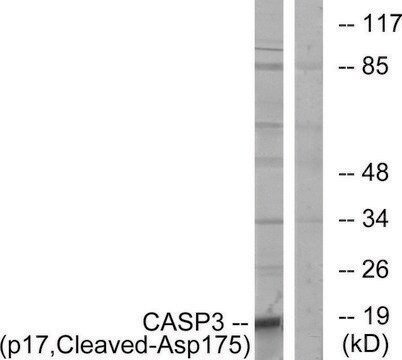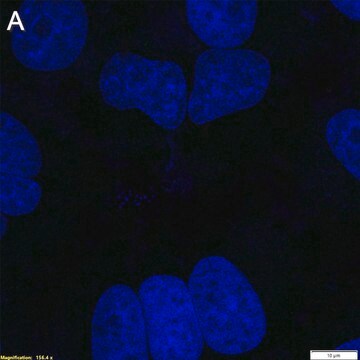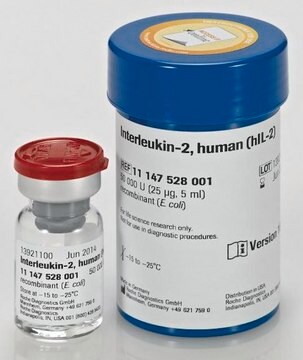HT2 Clone A5E
92021401, mouse blood, Lymphoblast
Zaloguj sięWyświetlanie cen organizacyjnych i kontraktowych
About This Item
Kod UNSPSC:
41106514
pochodzenie biologiczne:
mouse blood
tryb wzrostu:
Suspension
kariotyp:
Not specified
morfologia:
Lymphoblast
produkty:
Not specified
receptory:
Interleukin 2 (IL-2), Interleukin 4 (IL-4)
Polecane produkty
Nazwa produktu
HT2 Clone A5E, 92021401
pochodzenie biologiczne
mouse blood
tryb wzrostu
Suspension
kariotyp
Not specified
morfologia
Lymphoblast
produkty
Not specified
receptory
Interleukin 2 (IL-2), Interleukin 4 (IL-4)
metody
cell culture | mammalian: suitable
Warunki transportu
dry ice
temp. przechowywania
−196°C
Pochodzenie linii komórkowej
Mouse helper T cell
Opis linii komórkowej
Derived in 1979 from BALB/c spleen cells activated by sheep erythrocytes in the presence of IL-2, the A5E clone was selected to provide a homogenous population that is highly sensitive to IL-2. This cell line expresses Thy-1 and Lyt markers in addition to high affinity IL-2 receptors. Substantial proliferation is seen in the presence of IL-4 (GM-CSF).
Zastosowanie
IL-2 assays
pożywka hodowlana
RPMI 1640 + 2mM Glutamine + 0.05mM 2-Mercaptoethanol (2ME) + 100-200 IU/ml IL-2 + 10% Foetal Bovine Serum (FBS).
Rutyna subkultury
Maintain cultures between 3-9x100,000 cells/ml; 5% CO2; 37°C. When starting from a frozen ampoule, add thawed cells to a conical based centrifuge tube e.g. 15ml tube. Slowly add 4 ml of culture medium to the tube. Take a sample of the cell suspension, e.g
Inne uwagi
Additional freight & handling charges may be applicable for Asia-Pacific shipments. Please check with your local Customer Service representative for more information.
Ta strona może zawierać tekst przetłumaczony maszynowo.
Wybierz jedną z najnowszych wersji:
Certyfikaty analizy (CoA)
Lot/Batch Number
Przepraszamy, ale COA dla tego produktu nie jest aktualnie dostępny online.
Proszę o kontakt, jeśli potrzebna jest pomoc Obsługa Klienta
Masz już ten produkt?
Dokumenty związane z niedawno zakupionymi produktami zostały zamieszczone w Bibliotece dokumentów.
Nasz zespół naukowców ma doświadczenie we wszystkich obszarach badań, w tym w naukach przyrodniczych, materiałoznawstwie, syntezie chemicznej, chromatografii, analityce i wielu innych dziedzinach.
Skontaktuj się z zespołem ds. pomocy technicznej





![Adenosine 5′-[γ-thio]triphosphate tetralithium salt ≥75% (HPLC), powder](/deepweb/assets/sigmaaldrich/product/structures/319/398/e29221c2-3649-455b-bd33-583bb017ec7d/640/e29221c2-3649-455b-bd33-583bb017ec7d.png)

